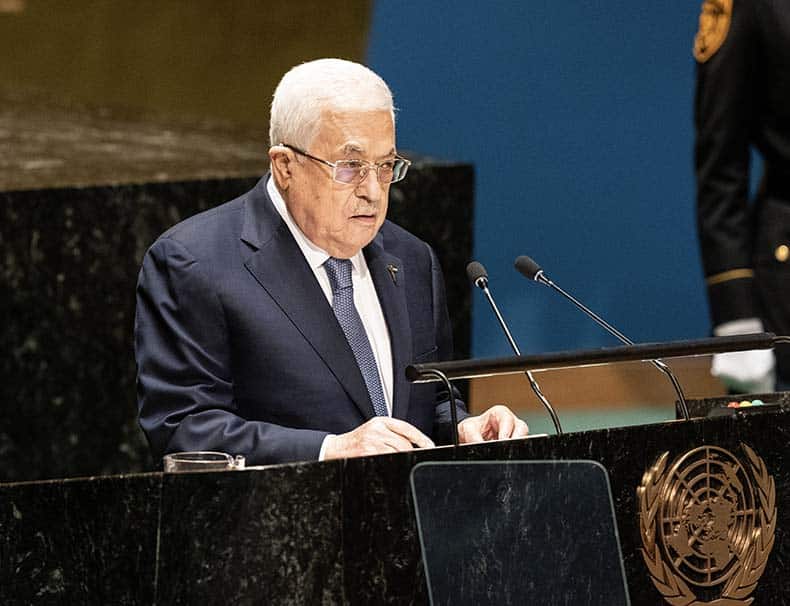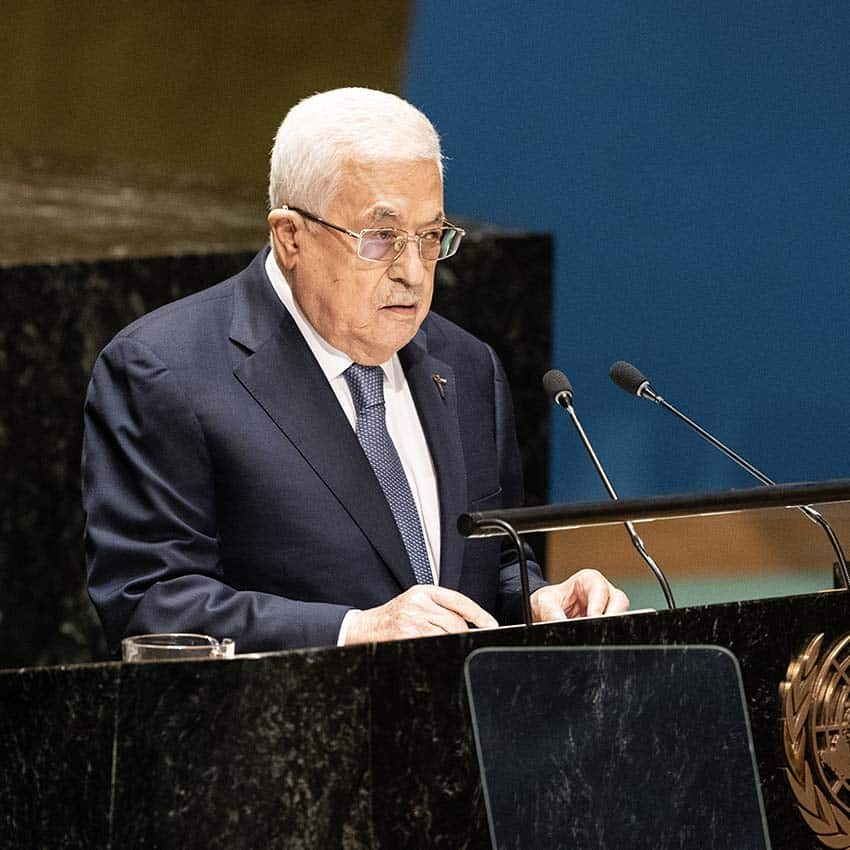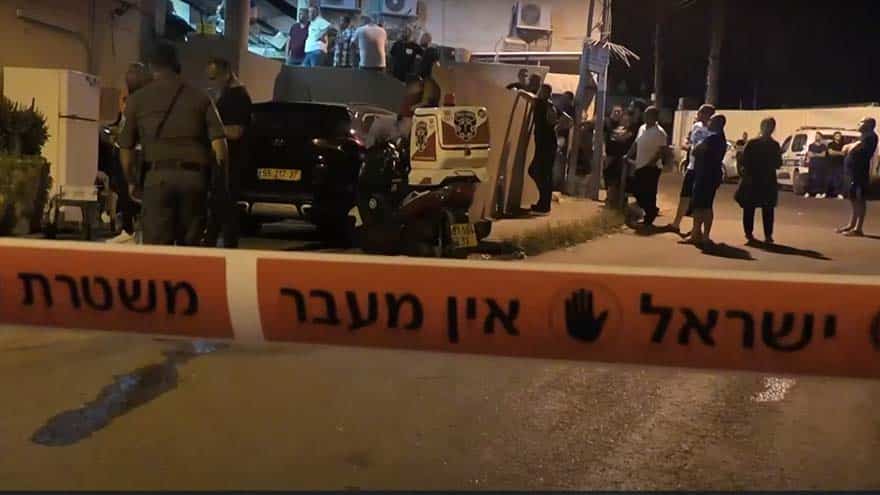On August 30, the U.S. Department of State announced its intention to revoke the entry visas of some eighty senior Palestinian officials, thereby preventing their arrival in the United States as part of the Palestinian delegation meant to participate in this month’s UN General Assembly debates. The President of the Palestinian Authority, Mahmoud Abbas (also known as Abu Mazen), is the most senior figure among the delegation members whose visas are expected to be denied.
In its decision, the State Department cited several main reasons, including the Palestinian Authority’s support for terrorism through payment mechanisms for prisoners and terrorists’ families, as well as the continued dissemination of antisemitic incitement. The U.S. administration emphasized that this step was intended not only to penalize the Authority for actions contrary to its commitments, but also to prevent the exploitation of the UN platform to promote a one-sided narrative that could strengthen extremist elements and undermine prospects for a future peace process.
The administration’s decision constitutes a dramatic, unusual, and even surprising move, accompanied by a clear and immediate practical consequence—Abbas will not be able to deliver his planned speech at the General Assembly debates, as he does every year. However, the U.S. will still allow the permanent Palestinian mission to participate in General Assembly discussions, although it is composed of lower-ranking representatives rather than senior officials from the PA and the PLO.
From the information published on the matter, it can be inferred that the American decision was essentially aimed at preventing leading European states—France and the United Kingdom—as well as Canada and Australia, from declaring at a special session, to be held alongside the Assembly debates, recognition of an independent Palestinian state. In this context, it should be noted that at least 147 out of the UN’s 193 member states have already officially recognized a Palestinian state. In contrast, the Palestinian delegation enjoys observer status in the organization’s deliberations (similar to the “Holy See” – the Vatican). However, it is essential to note that the establishment of a Palestinian state requires the approval of the Security Council, where the United States holds veto power.
One media report stated that the U.S. administration had recently warned the President of the Palestinian Authority against possibly using the General Assembly debates to declare “Palestinian independence” in his speech. In this context, it was reported that Palestinian representatives had already held talks with European officials several weeks prior, as part of preparations to formulate a political and diplomatic response to the U.S. administration’s intention to thwart the move.
In an official statement issued by the U.S. State Department on August 29, the reasons for the decision to prevent the issuance of visas that would allow senior Palestinians to participate in the General Assembly were clarified. The statement said: “Before the PLO and the Palestinian Authority can be considered partners in advancing peace, they must consistently renounce terror, including the massacre of October 7, cease incitement to terror in the education system as required by U.S. law, and as the PLO has previously committed to.” UN spokesman Stéphane Dujarric declared on August 30 that he intends to hold discussions with the U.S. State Department regarding the visa issue.
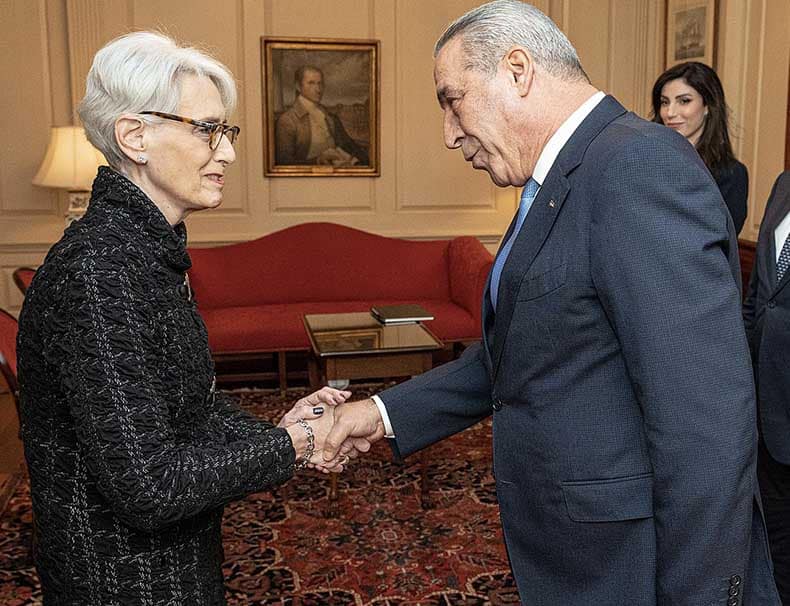
The Irony: The Palestinians Invoke International Law
The current American refusal to issue entry visas to the United States was not the first time that the administration in Washington has taken such action. A similar step was taken by the Americans in 1988 (about a year after the outbreak of the First Intifada), when the administration refused to issue a visa for PLO leader Yasser Arafat. That same year, a historic precedent also occurred when the UN General Assembly debates were moved from their permanent location in New York to Geneva (Switzerland) to allow Arafat to participate.
In the past, the UN has already ruled that the United States has the right to restrict representatives of member states and prevent them from participating in deliberations held at the organization’s headquarters in New York. Indeed, measures of this kind were taken in the past by the Americans against representatives from Russia, Iran, North Korea, and other states. However, these were expressed in restrictions on their movement within Manhattan rather than the denial of entry into the country.
The American move to deny entry to senior Palestinian officials was received by the Palestinian Authority with astonishment and, predictably, with considerable anger and resentment. Its officials hastened to declare that the decision was contrary to international law and the UN Charter, particularly given the fact that the “State of Palestine” holds official observer status. They called on the U.S. administration to reverse the decision and allow the Palestinian delegation to participate in the General Assembly debates “in line with its commitment to international law, legitimate international resolutions, and all of its obligations toward peace—as emphasized in the letter from President Mahmoud Abbas, which was sent to all world leaders, including U.S. President Donald Trump.”
Nabil Abu Rudeineh, Mahmoud Abbas’s spokesman, said in a media statement: “We call on the administration to revoke the decision, which violates international law, especially the agreement between the UN and the United States prohibiting denial of access to any delegation.” Senior officials in the Palestinian Authority expressed similar positions in conversations I had with them in recent days.
Alongside its call for the United States to reconsider its step, one senior Palestinian official, who was not identified by name, sought to play down its significance. He was quoted as saying that “its meaning is not yet clear at this stage,” noting that the Authority had not yet received official notification of the visa cancellations.
In any case, the American decision could escalate the confrontation between Washington and the Palestinian Authority and bring it to a new peak, since President Trump’s recognition of Jerusalem as Israel’s capital eight years ago. Unlike in the past, however, this time the Authority is attempting to avoid a deterioration in relations and is working to promote dialogue with Washington to contain and resolve the crisis, among other means, by utilizing Saudi Arabia’s good offices. Hussein al-Sheikh, Mahmoud Abbas’s deputy, met with Crown Prince Mohammed bin Salman in Riyadh in recent days and sought to enlist his support in persuading the U.S. administration to reverse the visa decision.
Al-Sheikh also recently sent a letter to U.S. Secretary of State Marco Rubio, in which he argued that the administration’s decision was based on false claims and recalled that in the same letter sent to world leaders—including President Trump—President Abbas unequivocally condemned violence and terrorism, including the October 7 attack. He added that the Authority is prepared to hold general and presidential elections within a year of the end of the war in Gaza, take responsibility for managing the Strip with the assistance of Arab partners, and participate in peace negotiations. “The decision to revoke the delegation’s visas, despite the clear commitments, reforms, and promises,” said Abbas’s deputy, “sends the wrong message at a moment when the entire region expects the U.S. to show leadership and fairness. This could silence the Palestinian voice at the UN precisely when constructive dialogue is needed to create momentum for peace.”
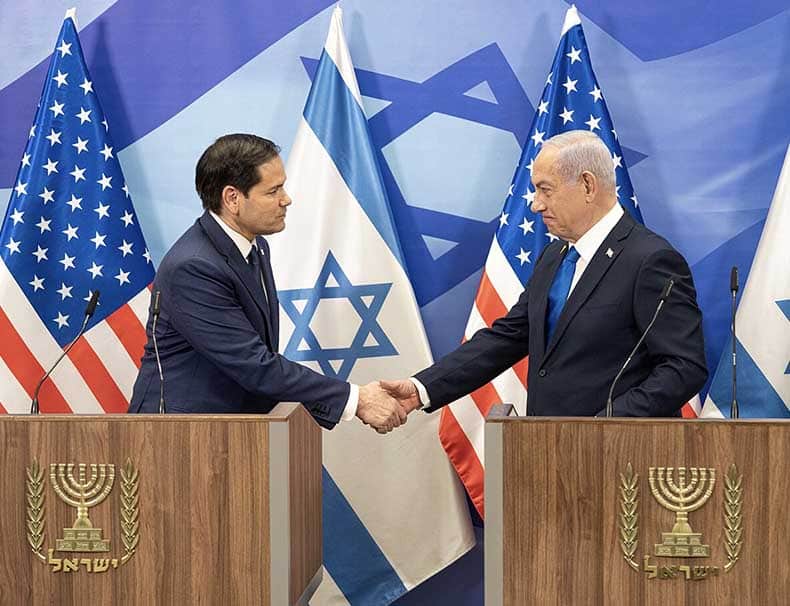
The Americans Spoiled the Europeans’ Celebration
In the European Union countries as well, the American decision aroused considerable anger and resentment, particularly against the backdrop of the fact that some of them had planned to advance recognition of an independent Palestinian state in parallel with the convening of the UN General Assembly. The EU foreign ministers, who met on August 30 in Copenhagen, sharply criticized the decision, arguing that “the UN General Assembly cannot be subject to access restrictions.”
French Foreign Minister Jean-Noël Barrot emphasized during the Copenhagen meeting of foreign ministers that “the decision runs counter to the fundamental values of peace and international cooperation.” He stressed the importance of freedom of presence at the UN headquarters in New York for all member states, arguing that restrictions on the participation of any delegation in Assembly debates infringe upon the rights of member states. He further added that France will continue to support the Palestinians’ right to present their positions in international forums, and called on EU member states to adopt a united stance expressing support for that right as well.
Spanish Prime Minister Pedro Sánchez initiated a call with Mahmoud Abbas, in which he expressed support for him in the face of the American administration’s decision. “It is not fair,” Sánchez was quoted in the media as saying, adding that “Palestine has the right to make its voice heard at the UN and in all international forums.” Spanish Foreign Minister José Manuel Albares declared that the American move was “unacceptable.” At the same time, Irish Foreign Minister Simon Harris stated that the EU must protest the American decision “in the strongest possible terms.”
Luxembourg’s Foreign Minister reinforced this, telling journalists, “We cannot be held hostage,” and suggested convening a special session of the General Assembly in Geneva to ensure the participation of Palestinian representatives, as had happened in the past. “We must be able to deliberate together,” he stressed. “We cannot simply say we are excluding the Palestinians from the dialogue.”
Rewarding Terror – and the Necessary Response
In contrast to most European states and to the outrage in the Palestinian Authority, Israel broadly welcomed the decision to deny entry visas to members of the Palestinian delegation, with appreciation and satisfaction. The issue even came up at the end of August in a meeting between Foreign Minister Gideon Sa’ar and U.S. Secretary of State Marco Rubio in Washington. According to media reports, Sa’ar encouraged his counterpart to impose restrictions on the participation of the Palestinian delegation in the UN General Assembly debates. After the U.S. administration announced its intention not to issue visas to senior Palestinian Authority officials, he thanked President Donald Trump and the Secretary of State for standing by Israel and for “resisting the attempts of the PLO and the Palestinian Authority—responsible for rewarding terror and incitement—to employ instruments of political-legal warfare.”
In conclusion, the intention of several Western states—especially France—to convene a summit in New York during September, at which formal recognition of an independent Palestinian state would be declared, forms the backdrop to the U.S. administration’s decision not to issue entry visas to senior members of the Palestinian delegation, most notably Mahmoud Abbas. From Israel’s perspective, the intention to promote recognition of an independent Palestinian state is essentially a provocative step, one that is primarily symbolic and politically limited in nature. Nevertheless, Jerusalem must partner with the U.S. administration’s efforts to thwart the move, as it is an initiative that cannot be accepted—especially in the wake of the deadly terrorist attack of October 7, 2023, and at a time when Israel is still in the midst of a campaign against Hamas, which controls the Gaza Strip and holds dozens of hostages in inhumane conditions. Under such circumstances, recognition of a Palestinian state is an absurd, wholly unacceptable move that amounts to rewarding terror.
In any case, advancing recognition of a Palestinian state in practice would compel Israel to consider adopting retaliatory and countermeasures aimed at undermining the decision and draining it of substantive meaning. Within this framework, Israel could adopt a series of measures, foremost among them applying sovereignty over the area of Judea and Samaria or parts of it (Area C, the Jordan Valley), declaring the annulment of the validity of the agreements signed with the PLO under the Oslo process, and ceasing support and security cooperation with the Palestinian Authority.
